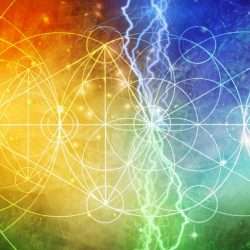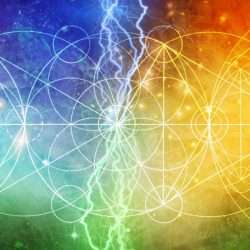{This is a chapter excerpt from Soundscapes & Psychedelics (2014), originally titled “Organic vs. Synthetic”. This book is now out-of-print and entirely unavailable to the public. But you can watch a lecture I gave outlining the thesis of the book here.}
Organic Vs. Synthetic
The discussion of organic vs. synthetic within this essay is intended to establish a framework for the use synthetic psychedelics as having the potential to offer substantial personal benefit. As mentioned previously, the prevailing belief systems regarding synthetic psychedelics—new as in the case of “research chemicals,” or old in the case of MDMA or LSD—within contemporary psychedelic spirituality is that organic psychedelics are somehow superior to synthetic ones, or worse, that there is something inherently wrong with synthetic psychedelics. For the purpose of this discussion, the ability to release that belief construct in order to engage a broader viewpoint of the subject will be vital.
To support the release of this belief system, I offer three questions, which I am going to address in the order they are presented:
- What is it that is happening psychopharmacologically when psychedelics are taken, “organic” or otherwise?
- From where do these experiences arise?
- What denotes “organic” within a broader picture of humanity’s technological advances as an expression of natural evolution?
What is it that is happening psychopharmacologically when psychedelics are taken, “organic” or otherwise?
When a psychedelic substance is taken, organic or synthetic, we are taking a psychoactive compound into the body to catalyze a biochemical change. Within an organic psychedelic such as psilocybin mushrooms, there are primary psychoactive alkaloids that facilitate this process; psilocybin and psilocin. Yes, the total composition of the organic substance, mushrooms, in this case, possesses much more than the psychoactive alkaloids alone. These other compounds contribute to the dynamics of their experiential characteristics according to the framework of nutritional compensation and perception explored alter in this essay. But essentially, the active components that are facilitating the psychoactive experience are specific compounds that can be synthesized to create similar effects.
Personally, I can see how taking a psychedelic into the body in its ‘whole food’ form can be psychologically representative of engaging in a grander organic process, and in turn subconsciously encourage a more naturalistic reverence, yet the science remains that it is a biological messenger that is catalyzing the psychedelic effects and those messengers can, for the most part, be recreated in a lab.
Furthermore, these compounds can be altered to the effect of changing the experiential characteristics of that substance, offering a different set of lessons, perspectives, thoughts, ideas, etc. to the person taking that substance. We can even synthesize brand new compounds that create vastly different experiences based on what we have learned from experimenting and exploring compounds previously found to produce certain effects, creating an entirely new set of potentials within the experience of the individual using them. Where in this observation does the spectrum of valuable and not valuable regarding organic vs. synthetic come into play? It seems as though the only place is personal preference and within predetermined belief systems based in out of date logic.
From where do these experiences arise?
Contrary to popular opinion in the psychedelic spiritually culture, it is not the plant or compound that is giving you the experience. It is a relationship between human biology and the chemical composition of the substance/plant that results in a change of awareness. Wherein, the specific symbolism or topics that manifest within the experience are in accordance to the unique information present within an individual’s subconscious[1], brought out in relationship to the effects of the chemical composition of the substance/plant.
The caliber of consciousness that arises with their use is only present within the human experience, and the human experience is a fundamental component to creating it.
This isn’t to say we should not offer reverence to a substance we use for personal growth or to get cocky in ourselves about it; the offering of reverence and gratitude to a substance may create a healthy psychological relationship to that substance within the user, helping to better facilitate constructive experiences[2]. What I am saying is that there is no empirical structure of value that says some compounds are “more alive” than others when it comes to psychedelics; life manifests in many different ways.
Psychedelics can be seen simply as keys to unlock different elements of the human mind; biochemical catalysts of consciousness change. We can use different keys for different results; different compounds for different states of consciousness. The spectrum of value is based on a functionality according to personal intentions of use, rather than an objective feature of the substances themselves, or their source.
What denotes “organic” within a broader picture of humanity’s technological advances as an expression of natural evolution?
Lastly, when it comes to the discussion regarding organic vs. synthetic, let me ask you this: is there somewhere within the planet’s evolution where that evolution has disconnected from us? The perception that the results of science and technology are somehow not a part of the organic evolution of the planet itself is problematic and expresses a value judgment, rather than empirical fact. Such a perception is sourced in the very same separation from the autonomic patterns of life on this planet that many claim to be the fundamental flaw in the human species. Yet, the very people discussing this perception as being a problem often perpetuate the same separation through denouncing technology outright.
Again, regardless as to whether or not the perception of that disconnect being a vital flaw is correct, which I believe it is, the belief of synthetic compounds as being somehow wrong or “unnatural” within the broader perspective of human evolution as a part of planetary evolution is, again, problematic and only further perpetuates the problem of this flaw. How could anything that exists in reality be “unnatural”? Isn’t everything that exists “natural” in a fundamental sense? To judge that something made by humans is “unnatural” dismisses the products of human invention as somehow separate from the context in which they were created and given form. Again, this is a value judgment that reflects the aforementioned perspective, which is itself a construct of human thought and categorization.
When we choose to look at all things humanity creates and relates to as a natural part of the organic evolution of the planet and stop creating egoic value systems of ‘right and wrong’ based on source rather than evidence, we can break from illusory belief structures such as organic vs. synthetic. In turn, we can enter a more holistic perspective of looking at the big picture, examining cost vs. gain, and making our choices relative to the question of, “does this generate widely beneficial results or detrimental results?” In regards to psychedelic compounds, the value spectrum then evolves from organic vs. synthetic to cost vs. gain. This evolution of perspective enables us the freedom to make personal choices according to “does this serve me in the manner in which I am looking to be served, or not?”
Of course, a consideration of the fact that we are integrated into the whole system of the planet and that choices that are detrimental to the planet are detrimental to us as well, is vital. But one doesn’t need to adhere to the belief system that if it grows in the ground it’s ‘good’, and if it came from a lab it’s ‘bad’, in order to make choices within a holistic perspective (especially when it comes to psychedelics). A value spectrum based on such a perspective is naïve thinking; it’s not that simple.
Notes
[1] The symbolism arising, depending on the experience, may reach as deep into the psyche as the Jungian collected unconscious in the form of ‘archetypes’ or beyond.
[2] Of course, this offering of reverence needs to be within reason; the creation of religious idolism and worshipping plants as deities may prove problematic.
Thanks for reading!
My ideas have grown a lot since I wrote that piece. In fact, very significantly as I wrote that entire book during my process of grappling with an ayahuasca experiences showing me that everything I once spiritually believed in was a lie. I was very cynical at that time. In many ways, the harsh rationalism was my answer to the cosmic indifference I confronted at that time. You can hear more about that story in this video.
Also,
you can support my psychedelic research (writing, podcasting, YouTube-ing) by:
- Becoming my patron on Patreon
- Dropping a donation via PayPal or cryptocurrency
- Buying a copy of one of my still available books
Thank You ♥







